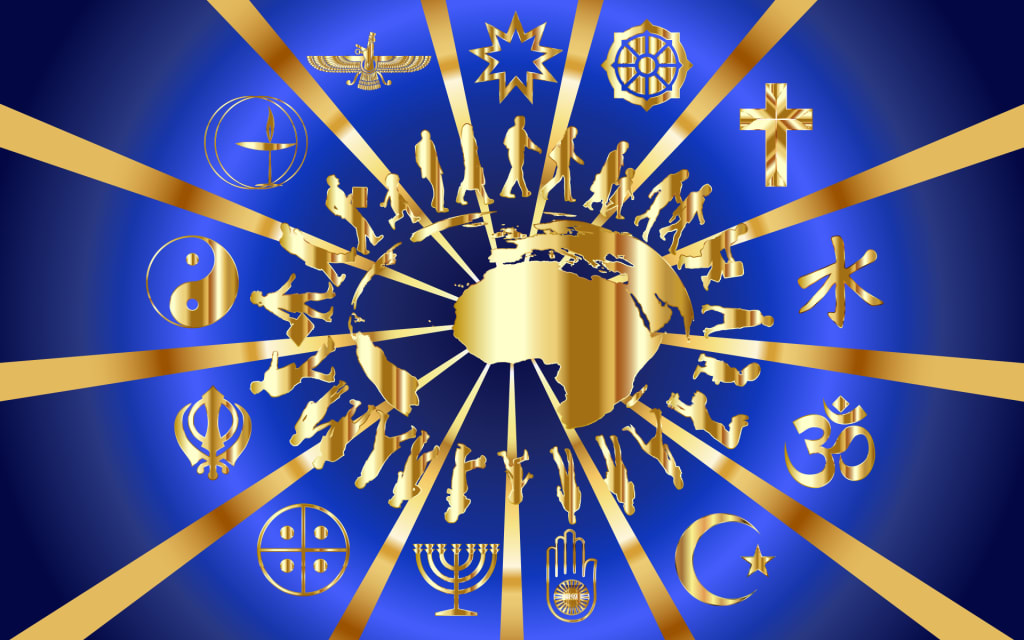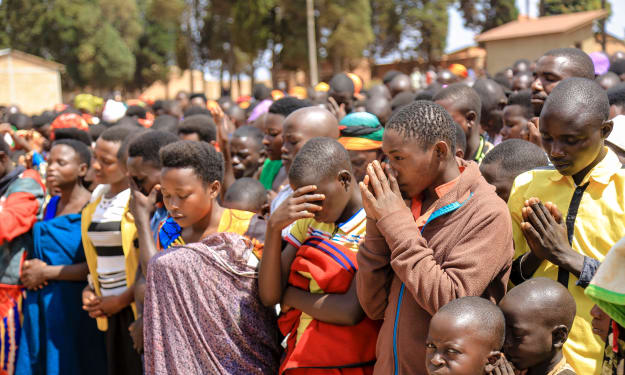What is religion?
The Significance and Impact of Religion in Human History

Religion was a concept that played a significant role in the history of humanity. At its core, religion refers to a set of beliefs and practices that relate to the understanding of the ultimate nature of reality and the meaning of life.
The Significance and Impact of Religion in Human History
There are numerous religions, each with its own set of beliefs and practices. Christianity, Islam, Buddhism, Hinduism, and Sikhism are some of the most well-known religions. Each of these religions has its own set of teachings, texts, and rituals that its adherents follow.
One of the most important aspects of religion is the belief in a higher power or divine being. This belief can take many forms, ranging from the traditional concept of God in monotheistic religions to polytheistic religions' multiple gods and goddesses.
Another important aspect of religion is the role it plays in shaping its adherents' moral and ethical beliefs. Many religions have their own codes of conduct and moral teachings that guide their followers' behavior. Religion also plays an important role in shaping society's social and cultural fabric.
Many religious communities have their own set of customs, traditions, and festivals that bring people together and foster a sense of community. Religion still has a significant influence on billions of people's lives in the modern world. It is a subject that is worth delving more into whether you are a devoted adherent of a certain religion or you are just inquisitive about the significance of religion in human history.
Religious beliefs and practices from the beginning
For thousands of years, religion has been a fundamental part of human existence. As early humans began to ponder the natural world's mysteries, they developed religious beliefs and practices to explain their surroundings and understand their own existence. Animism, the belief that all things, including inanimate objects, have a spirit or soul, and shamanism, which involves the use of ritualistic practices and trance-like states to communicate with the spiritual realm, are two of the earliest known religious practices.
See also Unveiling the Oldest Religion: Exploring the Origins and Beliefs of Ancient Faiths
Religion's Evolution Throughout History
Religion has changed dramatically over time, with various religious beliefs and practices emerging in various parts of the world. Over thousands of years, major world religions such as Christianity, Islam, Buddhism, Hinduism, and Sikhism have developed complex belief systems as well as elaborate rituals and practices. Religion has also played an important role in shaping societies' social, political, and cultural landscapes throughout history.
Religious Influence on Society
Throughout history, religion has had a significant impact on human societies. Religion has provided individuals with comfort and guidance, as well as fostered a sense of community and belonging among groups of people. Religious organizations have also had a significant impact on education, healthcare, and other aspects of social welfare. Religion, on the other hand, has been a source of conflict and division, with various religious groups occasionally engaging in violent conflicts or discrimination against one another. Religion has also been used to justify social and political oppression, with religious institutions sometimes siding with oppressive regimes or ideologies.
The Diversity of Religious Beliefs and Practices
A summary of major religions
The world is home to numerous religions, each with its own set of beliefs, practices, and traditions. Christianity, Islam, Hinduism, Buddhism, and Sikhism are some of the major world religions. These religions have millions of adherents around the world and have had a significant impact on human history and culture.
See also Major Religions In The World
Religions' differences and similarities
While each religion is distinct, there are many similarities and shared beliefs between them. Many religions, for example, believe in a higher power or divine being, and many have codes of conduct and moral teachings that guide their adherents' behavior. However, there are significant differences between religions, such as their perspectives on the nature of God, the meaning of life, and the afterlife.
Religious beliefs and practices differ according to region and culture
Religious beliefs and practices can also differ significantly depending on culture and region. Christianity, for example, has numerous denominations with varying beliefs and practices, and Islam has numerous sects and interpretations of the Quran. Furthermore, over time, many religions have adapted to local cultures, incorporating local customs and traditions into their practices. Hinduism in India, for example, differs from Hinduism in Nepal or Indonesia in terms of practices and beliefs.
Why Defining Religion is Challenging
Religion involves abstract and complex concepts
Religious beliefs can contain abstract and complex concepts that are difficult to fully comprehend or articulate. Concepts such as the nature of God or the afterlife, for example, may be difficult to fully comprehend, resulting in differing interpretations and understandings among believers.
There is a wide range of beliefs and practices
Even among followers of the same religion, there is a wide range of religious beliefs and practices. This could be due to regional, cultural, or personal factors influencing personal interpretations of religious teachings. For example, two Christians from different parts of the world may interpret different Bible passages differently due to their cultural backgrounds.
The impact of culture and individual interpretation on religious beliefs
Religious beliefs and practices can be influenced by culture and personal interpretation. Religious beliefs are frequently deeply ingrained in cultural traditions, and people interpret religious teachings differently depending on their cultural background and personal experiences. Even within the same religion, this can lead to differences in religious practices and beliefs. For example, two Muslims from different parts of the world may interpret the Quran differently due to their cultural and personal backgrounds.
Religion's continuing importance in modern society
Religion remains an important aspect of modern society, with millions of people worldwide practicing various religions. Religion has a significant impact on social and cultural institutions, as well as on individual and collective beliefs, values, and practices.
The significance of comprehending and respecting various religious beliefs and practices
Given the variety of religious beliefs and practices, it is critical to comprehend and respect various religious traditions. This includes recognizing and appreciating the cultural and historical contexts in which religions evolved, as well as the various ways in which people interpret and practice their faith. Respect for religious diversity can aid in the promotion of understanding and tolerance in society, as well as in the construction of bridges between different communities.
FAQ
1. What is the true meaning of religion?
The true meaning of religion is a set of beliefs and practices related to the ultimate nature of reality and the meaning of life. Religion provides a framework for comprehending the world and our place in it, and it frequently involves faith in a higher power or divine being.
2. What is religion and its purpose?
Religion serves a variety of functions for both individuals and society. It can give people and communities a sense of purpose, meaning, and identity. Religion can also provide moral and ethical guidance as well as a sense of comfort and hope during difficult times. Furthermore, religion can foster social cohesion and unity among people who share similar beliefs and practices.
3. Why do we believe in religion?
People believe in religion for a variety of reasons. Religion provides some people with a sense of meaning and purpose in life, answering questions about the ultimate nature of reality and the meaning of life. Religion can also provide comfort and hope in difficult times, as well as a sense of community and belonging. Furthermore, religion can serve as a moral and ethical decision-making guide, assisting individuals in navigating complex moral issues. Finally, the choice to believe in religion is a personal one influenced by a variety of factors such as upbringing, culture, and personal experiences.
4. What is religion in short answer?
Religion is a set of beliefs and practices concerned with the ultimate nature of reality and the meaning of life.
5. What are the 5 importance of religion?
The five functions of religion are as follows:
a) providing a sense of meaning and purpose in life
b) Providing moral and ethical guidance;
c) providing comfort and hope during difficult times;
d) promoting social cohesion and unity;
e) influencing art, literature, and architecture.
6. Why is it so hard to define religion?
Religion is difficult to define because it encompasses a diverse set of beliefs, practices, and traditions that differ significantly across cultures and time periods. Furthermore, religion frequently involves complex and abstract concepts, such as the nature of the divine, that are difficult to articulate.
7. Why did religion start?
Religion's origins are unknown, but it is thought that early humans developed religious beliefs to explain the mysteries of the natural world and to provide a sense of control over their environment. Religion also helped early humans make sense of their existence and cope with the fear of death. Religion evolved to serve a variety of other functions as human societies became more complex, including social cohesion, moral guidance, and cultural expression.
8. Why did religion start?
The exact reasons for the origin of religion are unknown, but it is thought that early humans developed religious beliefs to explain the mysteries of the natural world and to provide a sense of control over their environment. Religion also helped early humans make sense of their existence and cope with the fear of death. Religion evolved to serve a variety of other functions as human societies became more complex, including social cohesion, moral guidance, and cultural expression.
9. What was the first religion?
Religious beliefs and practices are likely to have existed for as long as humans have been capable of abstract thought, making it difficult to pinpoint the first religion. Animism, the belief that all things, including inanimate objects, have a spirit or soul, and shamanism, the use of ritualistic practices and trance-like states to communicate with the spiritual realm, are two of the earliest known religious practices.
10. Is it possible to define religion?
While religion encompasses a wide range of beliefs, practices, and traditions that vary greatly across cultures and time periods, religion can be defined in broad terms. Religion is typically defined as a set of beliefs and practices related to the ultimate nature of reality and the meaning of life. These beliefs frequently include a belief in a higher power or divine being, and religious practices frequently include rituals, prayer, meditation, and other forms of spiritual practice.
https://www.radafacts.com/2023/01/what-is-religion.html
About the Creator
Enjoyed the story? Support the Creator.
Subscribe for free to receive all their stories in your feed. You could also pledge your support or give them a one-off tip, letting them know you appreciate their work.





Comments
There are no comments for this story
Be the first to respond and start the conversation.